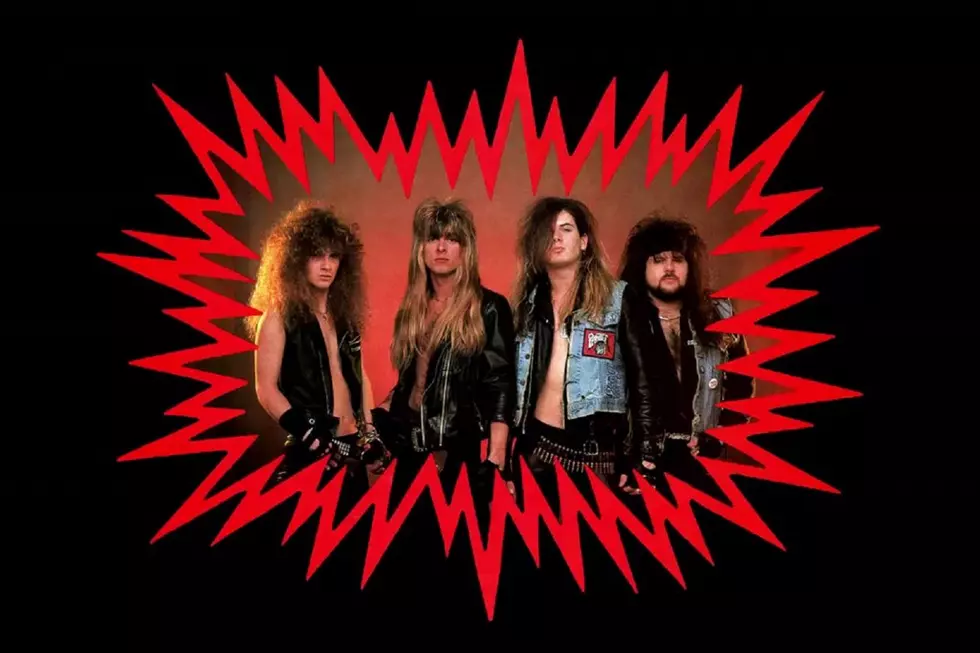
When Pantera Took a Final Glam Bow on ‘Power Metal’
Pantera will go down in history as one of the most powerful heavy metal bands ever, often credited with keeping the genre afloat when it was out of style in the mid-'90s. It’s a road that wouldn’t have been taken had the band not evolved from its glam-metal roots, which showed its first signs of being uprooted with the release of Power Metal in May 1988, their first album with New Orleans native Phil Anselmo at the mic.
In the late ‘80s, Pantera were playing the Dallas area to packed rooms on a regular basis, benefiting from a strong local contingent of fans, sometimes as many as 2,000 a night. Yet when it came to getting a serious look from the industry, they were striking out; according to bassist Rex Brown they had been “turned down by major labels 28 different times.”
“Back in those days in Texas, you really couldn't play anywhere unless you had some following and you had to fit in with the trends that were going on,” Brown, then known as “Rex Rocker,” added. “In the '80s Texas club days, it was all about cover songs.”
For their style of music and dress consisting of bullet belts, bracelets and random bandannas, along with striped spandex, studs and copious amounts of hairspray, singer Terrence Lee, aka Terry Glaze, was the perfect fit for the time. Guitarist Diamond Darrell (yet to be christened "Dimebag") had a penchant for the heavier side of music, and it started to creep into Pantera's live shows to the point where it would be at odds with the singer’s preferences.
"With Terry, it had its heavy moments, but he always wanted to be like a David Lee Roth kind of a pop fucking metal dude," drummer Vinnie Paul said. "It was cool, but it was also at a time when that was kind of on its way out. Me and Dime wanted it to be heavy, but when we started doing the covers of Metallica and Slayer and stuff, Terry didn't want to sing them. He'd just leave the stage. Dime would sing them, and we'd do it as a three-piece and just fucking crush.”
Lee didn’t disagree.
“We were all listening to Van Halen, Def Leppard and stuff like that, but Darrell and Rex were the ones that discovered Metallica and they started going in that direction,” Glaze said. “I kind of followed but I felt with that kind of music, the guitar was the hook and the vocals were secondary. I liked songs that you could wash your car to – where the vocals were the hook. But the band direction was going away from that to a place where the song was driven primarily by guitar hooks.”
That was the goal for the first three Pantera LPs – Metal Magic (1983), Projects in the Jungle (1984) and I Am the Night (1985) – all of which came out on their homegrown Metal Magic label and were produced by Darrell and Vinnie’s father, Jerry Abbott, who was credited as “The Eldn’.” Then, after meeting and jamming with Metallica, and the game-changer release of Master of Puppets, a much heavier course was set for Pantera, leading to a parting of ways with Glaze in mid-1986.
Over the next several months, Pantera would try out a series of singers, with none of them sticking around for very long. One name that kept popping up was Anselmo, an 18-year-old Rob Halford-like screamer who was playing many of the same spots in Texas and Louisiana fronting the band Razor White. The singer was asked to try out and then to relocate to Arlington, Texas, where the task was set to reclaim a fan base that had virtually disappeared as the revolving door of vocalists spun. Not only that, but the newest member of Pantera had a decidedly different notion of how the group should look and sound.
“I had my idea of what heavy should be, and they had their idea of what heavy was,” Anselmo said. “So, there was a lot of education between the four of us, and a lot of growing up between the four of us to even get to a point where we actually did destroy the myth of the club band. And the club band back in the '80s was to dress and look like Motley Crue or you don't have a gig. So for me, this was one of the toughest times of my fucking life, because I was playing that part and I fucking hated it, honestly.”
Acquiescing to “play by the rules … because I needed to belong early,” Anselmo walked into a situation where the melodies on the next record by Pantera were two-thirds completed, with Glaze having laid down some vocals that were quickly scratched, according to Brown. There was no denying the music began to take on a harder edge with the singer’s influence. While they’d be driving from gig to gig, Anselmo would be controlling the radio, putting on everything from Mercyful Fate to Soundgarden to Venom.
“Phil started turning us on to all kinds of different stuff that we hadn’t listened to before, because he turned out to be the biggest fucking metal head of all time,” Brown said. “He knew every fucking band there was to know.”
“We listened to some new demos that they were doing, and it was pretty obvious that it was very, very aggressive compared to the other records,” Anselmo added.
Thrash metal was entering its peak of popularity at the time, with Metallica, Anthrax and Megadeth at the top of the list in terms of finding success that was close to crossing over to the mainstream. The album that would become Power Metal began to take shape with some of those cues, none of which aligned with Gold Mountain Records, a label with an MCA distribution deal that had been keen to sign the band when Glaze was singing. Now, with Anselmo in the fold, they were less inclined to invest in what they perceived as a less-marketable sound.
“They wanted to change our style and make us sound like Bon Jovi, which is not quite up our alley,” Paul told Metal Forces in 1988.
Pantera’s relationship with Gold Mountain and its head, Danny Goldberg, had come about through the band’s friendship with Marc Ferrari of the Los Angeles metal group Keel, who were on their third album with the label (two of them were produced by Gene Simmons). Ferrari would not only play a fade-out solo on the Power Metal track “We’ll Meet Again,” he also contributed “Proud to Be Loud," a song that would later appear on Keel’s Back in Action LP a decade later.
Not surprisingly, Power Metal is the epitome of the sound of a band in transition. There are Judas Priest-style anthems in “Rock the World” and “Death Trap,” and “We’ll Meet Again” was the precursor to the Cowboys From Hell centerpiece “Cemetery Gates” just two years later. The shredding fretwork of Darrell is what really stands out – from the outset of the title track to the blazing solo on “Over and Out.”
“It’s a pretty solid metal record all around, in the vein of Judas Priest," Anselmo said. "And really Dimebag, some of the riffs on that record are brutal. I say to any guitar player out there, good fucking luck trying to play those riffs. Matter of fact, specifically the song 'Power Metal' itself, good luck trying to play that riff with conviction and accuracy, ‘cause that is a fuckin’ hard riff to play.”
The glam holdovers were undeniable. Check ever-so-'80s “Hard Ride” or "P*S*T*88" featuring Darrell on vocals. There would still be vestiges of their past on Cowboys From Hell too, with Pantera finally coming into their own completely on Vulgar Display of Power in 1992. Power Metal was where there were more than mere flashes of what was to be, with fully formed elements of the future.
"To say I'm proud of it, no, I'm not," Anselmo later argued. "But to say that we as a band were still trying discover who the fuck we were and what we could do, that's very evident. I did the best I could, and I think the songs were heavier overall, more attacking."
See Pantera in the Top 50 Heavy Metal Albums
More From KOOL 101.7





![Get A Sneak-Peak At Amsoil Arena’s New Food Items [Video]](http://townsquare.media/site/163/files/2018/10/11794196_961432929910_1912018279730072402_o.jpg?w=980&q=75)




